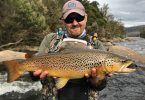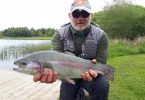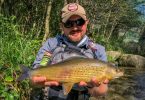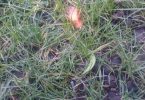Competitive angling seems to receive a fair amount of negative comment, as one acquaintance said ‘nothing but cheats and w*nkers, but competition anglers have revolutionised angling over the last decades. The serious competitive anglers in their search for an edge very often have devised techniques and tackle we now take for granted. The same competitors often devise fly patterns and styles that find their way into mainstream angling, improving the chances for all who fish.
What kind of person is a competition angler? All anglers are competitors, either with their Quarry, friendly competition with their boat partner, or the occasional club competition, or maybe a competition such as the world cup on mask, in which most anglers fishing are only along for the craic.
The main difference for the serious competitor is that we work at it. A day on the Lough tends to become 8 hours hard work. Total commitment, hours of practice with different methods and techniques, practice days using flies and lines you don’t think will work, but need to try in case they do. Like all successful sports people, even successful businessmen et al, it takes work, more work, and hard work to be a success. It is possible to win without working, but to do it consistently takes practice and work. When fishing river competitions with drawn beats, luck does come into it, but even on good beats the better anglers will come out on top.
Most of my competition fishing has been done on the Loughs, I prefer fishing these competitions. I have won on rivers, but prefer to leave them for a couple of hours of enjoyment as a pleasure angler, not working for another competition. The last few years I have found I no longer work so hard at competing, as they say I have lost my edge. This is partly due to the fact that having represented Ireland internationally and been Irish Champion I now find myself less hungry for success. That being said, maybe I am just tired of hard work.
But enough meandering, the purpose of this article is to give the angler an insight into what makes a successful competition angler. I would say concentration is one of the most important ingredients. Total concentration. Every fish missed is a fish lost. Every fish not seen is a fish lost. Every fish lost is one less to weigh in, one less than somebody else.
It is hard work concentrating for hours on end, harder than the day job most of the time. This however means you will see fish that don’t rise with a large swirl or splash, those most anglers will hook. A large percentage of fish are felt by anglers, rather than seen, a felt fish is often missed or badly hooked and comes off. These ‘pulls’ are often too late to hook the trout properly, but with practice and concentration many of these fish can be seen before they are felt and struck accordingly. A good pair of glasses is a must for this, polarised glasses allow you to see fish you will miss otherwise. Sometimes these fish show as a brief flash of a flank, sometimes a flattening of a wave, at other times a brief glimpse of a shadow or the flash of an opening mouth… yes you can see this on the Loughs, just as you do on the rivers. Another tell-tale sign is the movement of the line, but this is only noticeable in a small wave or ripple, but it is in these conditions that these signs are most important as in a big wave the fish tend to break the surface to a greater extent. There are times when I have tightened into fish that I have not seen, but something in the vicinity of my flies looked odd or different. You wont always know what you have seen but with practice you will know something has changed, maybe a slight colour change, a shadow in the water, a wave in the wrong direction, anything out of the ordinary can signal a fish that would otherwise remain unseen.
I remember one competition on Lough Owel in particular; conditions were poor with a bare herringbone ripple, bright sky and too many boats. I was drifting into the back of Srudarra Island, when I noticed a fish following my point fly, Owel fish have a habit of doing this at times, I slowed the retrieve to no avail. I then stopped retrieving and watched, after about 60 seconds the fish opened his mouth, I saw the white flash, and I struck and shortly netted a fine 2 1/2-pound trout. The following drift in the same area I fished the hares ear nymph more slowly, casting a long line and inching it back just fast enough to keep the fly off the bottom, I had three more fish on the drift. One I saw the line tip pull down, another I saw move across a light spot on the lakebed. The third gave itself up, I saw nothing before the rod was almost wrenched out of my hand, he also was hooked well in the vee. After that drift the area I was drifting became like Dunloaghaire Harbour, boats nose to stern drifting behind me and the fish went AWOL.
I spent the rest of competition moving around the reed-beds fishing dry sedge and a small deer hair snail, for two more fish. I won the competition. The three fish that I had spotted taking deep made the difference. Spotting the fish following at depth had also shown me that the fish were in the area, and that they were feeding deep. This was after about four fruitless hours fishing, when most anglers would be fishing by rote rather than concentrating.
Another ingredient of a successful competitor is the ability and willingness to adjust to the conditions. A change of line can work wonders, a floating line normally fishes in the top foot of the water, if the fish are not at the surface go down. A sink tip will fish 4 to 5 feet down when fished slowly, 2 or 3 feet when fished faster, an intermediate will fish at almost any depth if left to sink and inched back, but about 4 feet deep when fished normally. A sinking line fishes deeper again, depending on mass and time left to sink, this allows us to seek fish feeding at depth, which they do far more often than at the surface. Use a floating line if the trout are feeding on hatching insects, but if there is no sign of feeding fish or fly-life, go down. I always approach a competition with this in mind.
The ability of the angler to adapt does not mean just being willing and able to change lines, it needs forward planning. When I practice for a competition, I seek out areas where the trout are feeding on invertebrates such as corixae, shrimp, and hoglouse. Other food forms such as sticklebacks and fry are more easily found by sight. If you look at the Lough, you will see areas with vegetation below the water, these are the first places to try to find deeper feeding fish. You can search these areas during practicing by fishing hares ear nymphs, corixa imitations, such as the Invicta, silver invicta etc. and when fish are caught spoon them! I am amazed at the amount of anglers who do not even own a marrow spoon. Fish will at times take a fly just because it was there when they were feeding, not because it represents a food form they were feeding on, the angler carries on fishing the same pattern to no avail where were he to spoon the fish he would have seen what the fish was feeding on, and, if the food supplies are plentiful enough there will be other fish feeding on them. This is part of the ability to adapt, you can’t adapt to conditions if you don’t know what they are.
By searching through different drifts etc. you can build up a picture of the Lough, and know which areas have food available for the fish, this allows the third ingredient, planning, which is very important, unless you have a boatman or boat partner that has already done this for you. (But there again, in work you would not rely on others to organise important background material, you would check it yourself. Don’t rely on your boat partner to have all the answers, he might be relying on you!) This practice allows you to approach the competition with a plan. 1st try a @ z, 2n
d try b @ y etc. this allows you to fish where you expect to find fish feeding, that creates confidence, and if you expect to catch fish you will be looking for them, this helps your concentration.
It must be remembered also that fish will move if there is better feeding in other areas, so watch for surface activity to indicate a good hatch- Swallows are good watchmen- if you see them feeding low to the water there are flies hatching there. If the hatch is large and plentiful enough the fish will find it. Remember also the fish might be feeding on rising nymphs below the surface, they are easy pickings too. These fish may not come to the surface so as I said earlier, go down to them with either wet flies or nymphs that represent the food item. Most anglers know that river fish can be pre-occupied with certain food, because they can be easily seen in the shallower waters usually found in the rivers, and watched ignoring your fly. The angler will adapt and change fly and or presentation. Many anglers forget this when they arrive on a lake and insist on fishing traditional Lough style on the surface. I took a visiting angler out last season, he normally fished the English chalk streams and was telling me about how he fished them, often fishing upstream nymphs and emergers, and how he preferred this type of fishing to pulling lures on sinking lines for the reservoir rainbows when they weren’t feeding on the surface. He had not equated the fact that like the river fish, lake dwelling fish often feed at depth on the emerging nymphs rather than go to the top after them. Like many anglers he had assumed they were not feeding because he couldn’t see or catch them at the surface. There is nothing more exciting than seeing a large lake trout head and tailing over a fly tripped through the wave, but remember there are other ways to catch the fish.
Finally, when competition fishing, remember the object of the exercise is to catch more fish than the other competitors, but also it should be done with consideration to the other anglers, if you see some-one catching fish on a drift, by all means follow them down it, but approach the drift carefully and allow the other boat space to manoeuvre. Remember, you do not appreciate somebody cutting into your drift or motoring through it, don’t do it yourself. There have been times when a productive drift has been destroyed by an inconsiderate angler. A large volume of drifting boats will put fish down eventually, but one badly handled boat will put them down instantly. Sadly some anglers know no better, and the occasional one that will leave a now busy drift with the intention of spoiling it for others. Sadly even in the angling world there are poor sportsmen, it is up to us to uphold the sporting tradition. In recent times there has been talk of banning mobile phones in competitions due to people passing information to each other, it should be remembered that the phone is a valuable safety tool when out on a Lough, personally I believe if someone needs to ‘cheat’ to succeed, it is a hollow victory. Even ‘Competition’ anglers fish for the pleasure of spending time in the pursuit of their quarry, in beautiful surroundings away from the hustle and bustle of daily life, the prizes are a bonus. As a magnet on my fridge say’s ‘A bad day’s fishing is preferable to a good day’s work’







